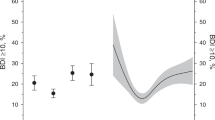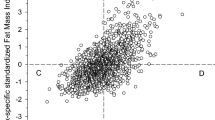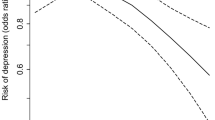Abstract
There is some evidence to suggest that obesity is a risk factor for the development of depression, although this is not a universal finding. This discordance might be ascribed to the existence of a ‘healthy obese phenotype’—that is, obesity in the absence of the associated burden of cardiometabolic risk factors. We examined whether the association of obesity with depressive symptoms is dependent on the individual's metabolic health. Participants were 3851 men and women (aged 63.0±8.9 years, 45.1% men) from the English Longitudinal Study of Ageing, a prospective study of community dwelling older adults. Obesity was defined as body mass index ⩾30 kg m–2. Based on blood pressure, high-density lipoprotein cholesterol, triglycerides, glycated haemoglobin and C-reactive protein, participants were classified as ‘metabolically healthy’ (0 or 1 metabolic abnormality) or ‘unhealthy’ (⩾2 metabolic abnormalities). Depressive symptoms were assessed at baseline and at 2 years follow-up using the 8-item Centre of Epidemiological Studies Depression (CES-D) scale. Obesity prevalence was 27.5%, but 34.3% of this group was categorized as metabolically healthy at baseline. Relative to non-obese healthy participants, after adjustment for baseline CES-D score and other covariates, the metabolically unhealthy obese participants had elevated risk of depressive symptoms at follow-up (odds ratio (OR)=1.50; 95% confidence interval (CI), 1.05–2.15), although the metabolically healthy obese did not (OR=1.38; 95% CI, 0.88–2.17). The association between obesity and risk of depressive symptoms appears to be partly dependent on metabolic health, although further work is required to confirm these findings.
This is a preview of subscription content, access via your institution
Access options
Subscribe to this journal
Receive 12 print issues and online access
$259.00 per year
only $21.58 per issue
Buy this article
- Purchase on Springer Link
- Instant access to full article PDF
Prices may be subject to local taxes which are calculated during checkout
Similar content being viewed by others
References
Luppino FS, de Wit LM, Bouvy PF, Stijnen T, Cuijpers P, Penninx BW et al. Overweight, obesity, and depression: a systematic review and meta-analysis of longitudinal studies. Arch Gen Psychiatry 2010; 67: 220–229.
Istvan J, Zavela K, Weidner G . Bodyweight and psychological distress in NHANES I. Int J Obes Relat Metab Disord 1992; 16: 999–1003.
Crisp AH, McGuiness B . Jolly fat: relation between obesity and psychoneurosis in general population. BMJ 1976; 1: 7–9.
Magnusson PK, Rasmussen F, Lawlor DA, Tynelius P, Gunnell D . Association of body mass index with suicide mortality: a prospective cohort study of more than one million men. Am J Epidemiol 2006; 163: 1–8.
Kivimäki M, Jokela M, Hamer M, Geddes J, Ebmeier K, Kumari M et al. Examining overweight and obesity as risk factors for common mental disorders using fat mass and obesity-associated (FTO) genotype-instrumented analysis: The Whitehall II Study, 1985–2004. Am J Epidemiol 2011; 173: 421–429.
Lawlor DA, Harbord R, Tybaerg-Hansen A . Using genetic loci to understand the relationship between adiposity and psychological distress: a Mendelian randomization study in the Copenhagen general population study of 53 221 adults. J Intern Med 2011; 269: 525–537.
Blüher M . The distinction of metabolically ‘healthy’ from ‘unhealthy’ obese individuals. Curr Opin Lipidol 2010; 21: 38–43.
Wildman RP, Muntner P, Reynolds K, McGinn AP, Rajpathak S, Wylie-Rosett J et al. The obese without cardiometabolic risk factor clustering and the normal weight with cardiometabolic risk factor clustering: prevalence and correlates of 2 phenotypes among the US population (NHANES 1999–2004). Arch Intern Med 2008; 168: 1617–1624.
Kilpeläinen TO, Zillikens MC, Stanèákova A, Finucane FM, Ried JS, Langenberg C et al. Genetic variation near IRS1 associates with reduced adiposity and an impaired metabolic profile. Nat Genet 2011; 43: 753–760.
Kopelman PG . Obesity as a medical problem. Nature 2000; 404: 635–643.
Whitlock G, Lewington S, Sherliker P . Body-mass index and cause-specific mortality in 900 000 adults: collaborative analyses of 57 prospective studies. Lancet 2009; 373: 1083–1096.
Katzmarzyk PT, Janssen I, Ross R, Church TS, Blair SN . The importance of waist circumference in the definition of metabolic syndrome: prospective analyses of mortality in men. Diabetes Care 2006; 29: 404–409.
Kip KE, Marroquin OC, Kelley DE, Johnson BD, Kelsey SF, Shaw LJ et al. Clinical importance of obesity versus the metabolic syndrome in cardiovascular risk in women: a report from the women's ischemia syndrome evaluation (WISE) study. Circulation 2004; 109: 706–713.
Song Y, Manson JE, Meigs JB, Ridker PM, Buring JE, Liu S . Comparison of usefulness of body mass index versus metabolic risk factors in predicting 10-year risk of cardiovascular events in women. Am J Cardiol 2007; 100: 1654–1658.
Meigs JB, Wilson PW, Fox CS, Vasan RS, Nathan DM, Sullivan LM et al. Body mass index, metabolic syndrome, and risk of type 2 diabetes or cardiovascular disease. J Clin Endocrinol Metab 2006; 91: 2906–2912.
St-Pierre AC, Cantin B, Mauriège P, Bergeron J, Dagenais GR, Després JP et al. Insulin resistance syndrome, body mass index and the risk of ischemic heart disease. CMAJ 2005; 172: 1301–1305.
Calori G, Lattuada G, Piemonti L . Prevalence, metabolic features, and prognosis of metabolically healthy obese Italian individuals: the Cremona study. Diabetes Care 2011; 34: 210–215.
Arnlöv J, Ingelsson E, Sundström J, Lind L . Impact of body mass index and the metabolic syndrome on the risk of cardiovascular disease and death in middle-aged men. Circulation 2010; 121: 230–236.
Flint AJ, Hu FB, Glynn RJ, Caspard H, Manson JE, Willett WC et al. Excess weight and the risk of incident coronary heart disease among men and women. Obesity 2010; 18: 377–383.
Akbaraly TN, Kivimäki M, Brunner EJ, Chandola T, Marmot MG, Singh-Manoux A et al. Association between metabolic syndrome and depressive symptoms in middle-aged adults: results from the Whitehall II study. Diabetes Care 2009; 32: 499–504.
Koponen H, Jokelainen J, Keinänen-Kiukaanniemi S, Kumpusalo E, Vanhala M . Metabolic syndrome predisposes to depressive symptoms: a population-based 7-year follow-up study. J Clin Psychiatry 2008; 69: 178–182.
Golden SH, Lazo M, Carnethon M, Bertoni AG, Schreiner PJ, Diez Roux AV et al. Examining a bidirectional association between depressive symptoms and diabetes. JAMA 2008; 299: 2751–2759.
Gale CR, Kivimaki M, Lawlor DA, Carroll D, Phillips AC, Batty GD . Fasting glucose, diagnosis of type 2 diabetes, and depression: the Vietnam experience study. Biol Psychiatry 2010; 67: 189–192.
Kivimäki M, Tabak AG, Batty GD, Singh-Manoux A, Jokela M, Akbaraly TN et al. Hyperglycemia, type 2 diabetes, and depressive symptoms: the British Whitehall II study. Diabetes Care 2009; 32: 1867–1869.
Howren MB, Lamkin DM, Suls J . Associations of depression with C-reactive protein, IL-1, and IL-6: a meta-analysis. Psychosom Med 2009; 71: 171–186.
ELSA user guide and documentation. UK Data Archive. http://www.data-archive.ac.uk/findingData/snDescription.asp?sn=5050 (accessed 21 August 2008).
Steffick DE . Documentation of Affective Functioning Measures in the Health and Retirement Study (HRS/AHEAD Documentation Report DR-005). Survey Research Center, University of Michigan, USA: Ann Arbor, MI, 2000 Available at: http://hrsonline.isr.umich.edu/docs/userg/dr-005.pdf.
Irwin M, Artin KH, Oxman MN . Screening for depression in the older adult: criterion validity of the 10-item center for epidemiological studies depression scale (CES-D). Arch Intern Med 1999; 159: 1701–1704.
Lyness JM, Noel TK, Cox C, King DA, Conwell Y, Caine ED . Screening for depression in elderly primary care patients. A comparison of the center for epidemiologic studies-depression scale and the geriatric depression scale. Arch Intern Med 1997; 157: 449–454.
Graig R, Deverill C, Pickering K . Quality control of blood, saliva and urine analytes. In: Spronston K, Mindell J (eds). Health Survey for England 2004, Methodology and Documentation. Vol. 2, The Information Centre: London, 2006, pp. 34–41.
Hamer M, Molloy GJ, Stamatakis E . Psychological distress as a risk factor for CVD events: pathophysiological and behavioural mechanisms. J Am Coll Cardiol 2008; 52: 2156–2162.
Zaninotto P, Pierce M, Breeze E, de Oliveira C, Kumari M . BMI and waist circumference as predictors of well-being in older adults: findings from the English longitudinal study of ageing. Obesity (Silver Spring) 2010; 18: 1981–1987.
Almeida OP, Calver J, Jamrozik K, Hankey GJ, Flicker L . Obesity and metabolic syndrome increase the risk of incident depression in older men: the health in men study. Am J Geriatr Psychiatry 2009; 17: 889–898.
Pulkki-Raback L, Elovainio M, Kivimaki M, Mattsson N, Raitakari OT, Puttonen S et al. Depressive symptoms and the metabolic syndrome in childhood and adulthood: a prospective cohort study. Health Psychol 2009; 28: 108–116.
Goldbacher EM, Bromberger J, Matthews KA . Lifetime history of major depression predicts the development of the metabolic syndrome in middle-aged women. Psychosom Med 2009; 71: 266–272.
Hildrum B, Mykletun A, Midthjell K, Ismail K, Dahl AA . No association of depression and anxiety with the metabolic syndrome: the Norwegian hunt study. Acta Psychiatr Scand 2009; 120: 14–22.
Vogelzangs N, Beekman AT, Boelhouwer IG, Bandinelli S, Milaneschi Y, Ferrucci L et al. Metabolic depression: a chronic depressive subtype? Findings from the Inchianti study of older persons. J Clin Psychiatry 2011; 72: 598–604.
Carroll D, Phillips AC, Thomas GN, Gale CR, Deary I, Batty GD . Generalized anxiety disorder is associated with metabolic syndrome in the Vietnam experience study. Biol Psychiatry 2009; 66: 91–93.
Koenigsberg HW, Teicher MH, Mitropoulou V, Navalta C, New AS, Trestman R et al. 24-h Monitoring of plasma norepinephrine, MHPG, cortisol, growth hormone and prolactin in depression. J Psych Res 2004; 38: 503–511.
Licht CM, Vreeburg SA, van Reedt Dortland AK . Increased sympathetic and decreased parasympathetic activity rather than changes in hypothalamic-pituitary-adrenal axis activity is associated with metabolic abnormalities. J Clin Endocrinol Metab 2010; 95: 2458–2466.
Mancia G, Bousquet P, Elghozi JL, Esler M, Grassi G, Julius S . The sympathetic nervous system and the metabolic syndrome. J Hypertens 2007; 25: 909–920.
Rosmond R, Dallman MF, Björntorp P . Stress-related cortisol secretion in men: relationships with abdominal obesity and endocrine, metabolic and hemodynamic abnormalities. J Clin Endocrinol Metab 1998; 83: 1853–1859.
Yau PL, Javier DC, Ryan CM, Tsui WH, Ardekani BA, Ten S et al. Preliminary evidence for brain complications in obese adolescents with type 2 diabetes mellitus. Diabetologia 2010; 53: 2298–2306.
Dantzer R, O'Connor JC, Freund GG, Johnson RW, Kelley KW . From inflammation to sickness and depression: when the immune system subjugates the brain. Nat Rev Neurosci 2008; 9: 46–56.
Dowlati Y, Herrmann N, Swardfager W, Liu H, Sham L, Reim EK et al. A meta-analysis of cytokines in major depression. Biol Psychiatry 2010; 67: 446–457.
Lindström J, Ilanne-Parikka P, Peltonen M, Aunola S, Eriksson JG, Hemiö K et al. Finnish diabetes prevention study group. Sustained reduction in the incidence of type 2 diabetes by lifestyle intervention: follow-up of the Finnish diabetes prevention study. Lancet 2006; 368: 1673–1679.
Acknowledgements
The data were made available through the UK Data Archive. The English Longitudinal Study of Ageing (ELSA) was developed by a team of researchers based at University College London, the Institute of Fiscal Studies and the National Centre for Social Research. The funding was provided by the National Institute on Aging in the United States (Grants 2RO1AG7644-01A1 and 2RO1AG017644) and a consortium of UK government departments coordinated by the Office for National Statistics. MH was supported by the British Heart Foundation (RE/10/005/28296); GDB is a Wellcome Trust Career Development Fellow (WBS U.1300.00.006.00012.01); MK was supported by the National Heart, Lung, and Blood Institute (R01HL036310-20A2) and the National Institute on Aging (R01AG034454-01), NIH, US and the Academy of Finland. The funders had no role in the study design; in the collection, analysis and interpretation of data; in writing of the report; or in the decision to submit the paper for publication. The developers and funders of ELSA and the Archive do not bear any responsibility for the analyses or interpretations presented here.
Author contributions
MH had full access to the data and takes responsibility for the integrity and accuracy of the results. All authors contributed to the concept and design of study, drafting and critical revision of the manuscript.
Author information
Authors and Affiliations
Corresponding author
Ethics declarations
Competing interests
The authors declare no conflict of interest.
Additional information
Supplementary Information accompanies the paper on the Molecular Psychiatry website
Supplementary information
Rights and permissions
About this article
Cite this article
Hamer, M., Batty, G. & Kivimaki, M. Risk of future depression in people who are obese but metabolically healthy: the English longitudinal study of ageing. Mol Psychiatry 17, 940–945 (2012). https://doi.org/10.1038/mp.2012.30
Received:
Revised:
Accepted:
Published:
Issue Date:
DOI: https://doi.org/10.1038/mp.2012.30
Keywords
This article is cited by
-
The classification of obesity based on metabolic status redefines the readmission of non-Hodgkin’s lymphoma—an observational study
Cancer & Metabolism (2023)
-
Quality of life and psychosocial outcomes among children with metabolically healthy and unhealthy obesity
Pediatric Research (2023)
-
Genetic propensity, socioeconomic status, and trajectories of depression over a course of 14 years in older adults
Translational Psychiatry (2023)
-
Genetic propensity for obesity, socioeconomic position, and trajectories of body mass index in older adults
Scientific Reports (2021)
-
The handgrip strength and risk of depressive symptoms: a meta-analysis of prospective cohort studies
Quality of Life Research (2021)



